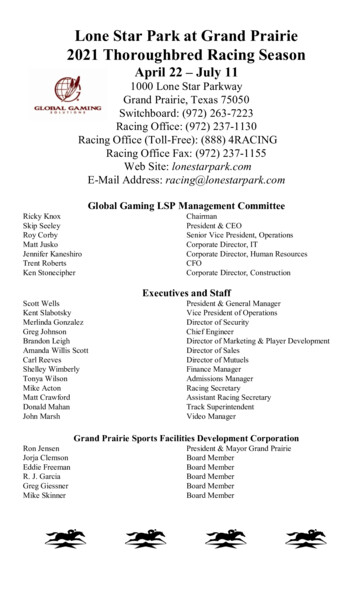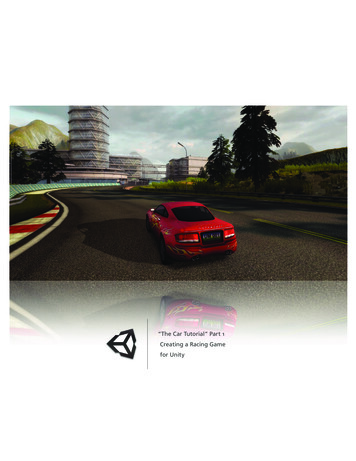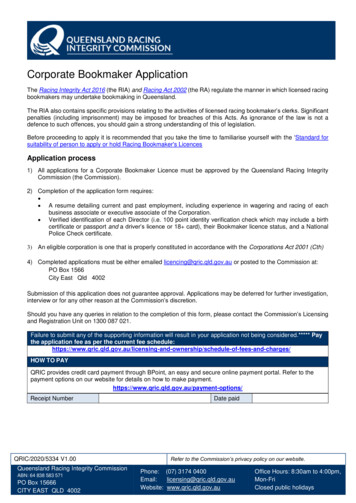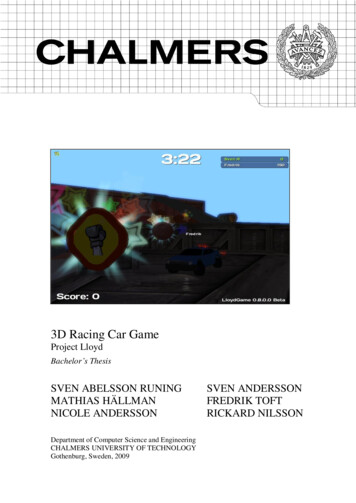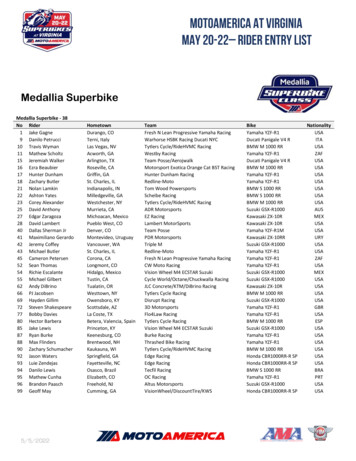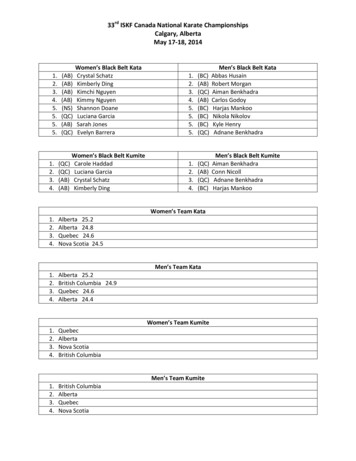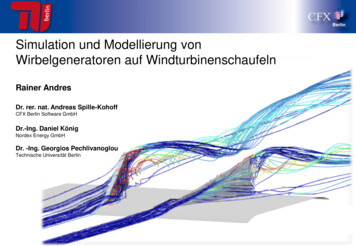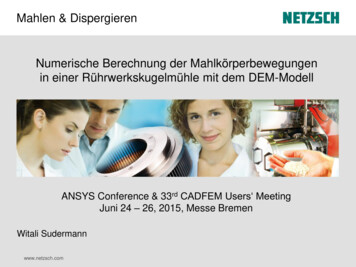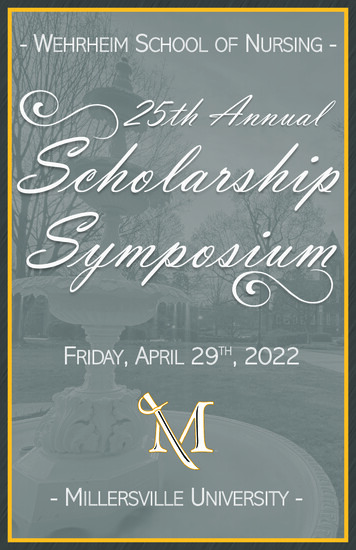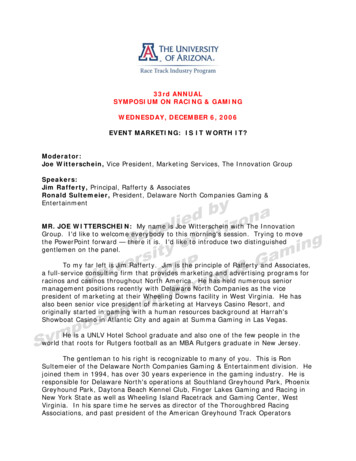
Transcription
33rd ANNUALSYMPOSIUM ON RACING & GAMINGWEDNESDAY, DECEMBER 6, 2006EVENT MARKETING: IS IT WORTH IT?Moderator:Joe Witterschein, Vice President, Marketing Services, The Innovation GroupSpeakers:Jim Rafferty, Principal, Rafferty & AssociatesRonald Sultemeier, President, Delaware North Companies Gaming &EntertainmentMR. JOE WITTERSCHEIN: My name is Joe Witterschein with The InnovationGroup. I'd like to welcome everybody to this morning's session. Trying to movethe PowerPoint forward — there it is. I'd like to introduce two distinguishedgentlemen on the panel.To my far left is Jim Rafferty. Jim is the principle of Rafferty and Associates,a full-service consulting firm that provides marketing and advertising programs forracinos and casinos throughout North America. He has held numerous seniormanagement positions recently with Delaware North Companies as the vicepresident of marketing at their Wheeling Downs facility in West Virginia. He hasalso been senior vice president of marketing at Harveys Casino Resort, andoriginally started in gaming with a human resources background at Harrah'sShowboat Casino in Atlantic City and again at Summa Gaming in Las Vegas.He is a UNLV Hotel School graduate and also one of the few people in theworld that roots for Rutgers football as an MBA Rutgers graduate in New Jersey.The gentleman to his right is recognizable to many of you. This is RonSultemeier of the Delaware North Companies Gaming & Entertainment division. Hejoined them in 1994, has over 30 years experience in the gaming industry. He isresponsible for Delaware North's operations at Southland Greyhound Park, PhoenixGreyhound Park, Daytona Beach Kennel Club, Finger Lakes Gaming and Racing inNew York State as well as Wheeling Island Racetrack and Gaming Center, WestVirginia. In his spare time he serves as director of the Thoroughbred RacingAssociations, and past president of the American Greyhound Track Operators
Association, Advisory Council member here at the University of Arizona Race TrackIndustry Program, and in his additional spare time the current president of theWorld Greyhound Racing Federation.I'm glad you could find time to join us, and I'd like to start with the panel.Jim?MR. JIM RAFFERTY: Thank you. Welcome all of you. Sorry my technical glitchgot us a delayed start.The question today was: Event Marketing: Is it worth it?I'm a presenter and here we go. I'd like to talk first with a resounding yeson yes, it's worth it. And I'll give a couple of points and review them.The first thing, trial. Getting new people to the property is what it's all aboutin event marketing. And you need, and particularly racetracks in North America,need new customers. It also helps set the tone for your property.As you advertise your racino, racetrack, casino, you need to be aware of theplace that's happening. And we'll get into details. Customers like invitations andthey like the social opportunity of events, and we see that in research throughouttown now. It feeds your brand. Whatever your brand is, events help position thatin the customer's mind. And we'll talk about that a little bit more.And, finally, it's genuinely fun. And that's going to be a big theme of today'sprogram, how do you make it fun? Let's talk about first, what are special events?And I call two classifications one: The classics, shows, concerts,tournaments, giveaways, and all the promotional things you might do. Festivals,wine, retail, New Year's Eve, the granddaddy of all events, and the famous DerbyDays. We'll talk about that more later.Customized events. And Ron and I have to work through some of theprograms you are all too familiar with, Polka Wednesdays. When I was at Harveysin Council Bluffs, Iowa, we had a racino there, Bluff's Run, and there was a greatmarketing guy there, Johnny Gomez. And Johnny was a longtime accordionist andentertainment guy. He started a program called Polka Wednesdays. Two o'clock inthe afternoon a polka band starts playing in the middle of the casino. And it wasbedlam on Polka Wednesdays at Council Bluffs. Hundreds of people, one of thebest bus days we had, it was a fabulous program, really helped our drive that dayand made Wednesdays. Polka Wednesday. I thought it was a little bit goofy atfirst.But when I went to Wheeling Island Racetrack and Gaming Center I said weshould do Polka Wednesdays, in the best spirit of a marketing guy stealing an idea.And, of course, Ron said, "That's crazy."
I think they are still doing Polka Wednesdays to this day. This was five yearsago or something.MR. RON SULTEMEIER: We're still arguing over the food.MR. JIM RAFFERTY: Well, they added a Polish buffet. Polka Wednesdayscontinues to help Wheeling Island, Bluff's Run, and gets a unique crowd that lovesto polka.I told the people from Mountaineer that I was going to sing their praisesbecause as a racino they do a great job, and we competed against them for manyyears. And I went to an event there called the West Virginia Derby, which was aspecial Derby, 700,000 purse, and it was just a fabulous madhouse of a specialevent. Something they solely created. I met the woman yesterday that created it.And it was a fabulous special event. We in the racino business have these naturalspecial events. The Triple Crown, like three additional holidays on the calendar.And you can go out and create additional events, the West Virginia Derby beingone. I thought it was a fabulous day, and I know it helped Ted on his bottom line.We did a program at Resorts in Indiana and we started a Charles Faybirthday celebration. Anybody know Charles Fay? He is the inventor of the slotmachine in 1903. He invented the first mechanical machine in San Francisco. Agreat guy, a great inventor, and a guy that has contributed a lot to my life. So wecelebrate Charles Fay's birthday. Some casinos celebrate it and we built a greatspecial event about the history and life of Charles Fay, and I think they are stilldoing it.I did a program with Bill Cosby, a charity event, when he was at Harveys.He was our corporate spokesperson. And we ran Bill Cosby concerts throughoutour four properties. Anywhere he went the proceeds went to charity. It was aninteresting twist on a special event. We brought in a different charity and had newbusiness associated with the charity. And I think we need to look at charities and acombination of charities and special events, and I've had some success with it.Last year I went to the Mohegan Sun Wine Fest. A fabulous event. Tens ofthousands of people, wine from all over the world. A fabulous thing.Let's go back through the key points. Trial, and what special events do areallow you to address a new business. You go in the database, find people like theevent, but advertise it retail-wise to all new people.Peter Drucker — I'm a big fan — he just died this year. One of the greatmanagement thinkers of our time. He wrote, "The sole purpose of a businessenterprise is to create a customer." And everything else beyond that is justadministrative. We serve the customer, we create a customer, and that's ourprimary role in business. Without them there wouldn't be a business.If that's the case then I want you to think about this for a second and take a
step back. And I've written four headlines about when you are going to tell yoursignificant other when you get home about the conference. And there will be four,you don't have to announce it, you don't have to write it down. Which ones fit whatyou have experienced so far?The racetrack industry, the only way to pull itself out is through intensecapital infusion that comes with slots. Is that going to be the headline that comesout of this conference? Or, racetrack management in America needs to get out ofthe caretaker mode? We've heard some speakers say that. I'll talk about thattoday a little bit.I wish I lived in Tucson.This is my personal favorite.And, lastly, the racetrack industry has a bright future because the BabyBoomers are going to love going to the track when they are 90. And I'm part of theBaby Boomer generation. There's a bunch of us, and we're going to have a lot ofincome and live forever. Well, not me, but most Baby Boomers because of thehealth care, etcetera.So the question is: What's the headline that's going to come out of thisconference for you? And I think — we talk about special events. I would point theanswer might be B. Racetrack management has to get out of the caretaker mode,be more aggressive, and I think event marketing can do that.And Drucker also said, "Don't confuse activity with accomplishment."Everything we do has to make sense from a business point of view. As I goaround the racino business I talk to many general managers and owners. It's justfatiguing, the big facilities and trying to keep them up and fight every day of yourlife for the capital necessary to keep the bathrooms right and the place lookingnew. It's tough for racino operators or racetrack operators particularly. It distractsus from doing what I think is the important duty of marketing.We must become creative, and creative marketing is the message I'm tryingto get to. Doing events is doing something, and we have to get on the move anddo something, rather than being tied to the albatross of the properties. We mustact and we must act now.We have to stop wasting time complaining. I rewrote this yesterday. Therewas a lot of complaining about taxes. Taxes are enablers and that's it. That's whatwe are going to do. I don't think we should spend time talking about them.We've tried that before. As a marketing person and consultant, all the timein management meetings. And people say, "In '64, we tried that, and I don't knowif we should try it again." Complaining that the slots get all the marketing dollarsthat happens all the time.The only tests that count are, does it make money, and does it drive
headcount in event marketing?Let's go back to point number two. Events set the tone of the property.Racinos should capture part of the consumer’s mind — that is an oldexpression. I think it's an important item talking about marketing. The customerholds us in a place in their mind. Like places that are friendly, do they think of yourracino, casino, racetrack when they think of friendly places? Do they think of yourracetrack when they think of where the action is? Do they think of your racetrackas places you can win big and customers want to win big? Do they think of yourracetrack when it's time for places to have fun? Our businesses own pieces of ourcustomer’s minds. To be fun is really important in that decision-making process.Your customers enjoy getting invited whether they come or not. One of thethings we found in direct mailing, you send them one invitation, you send themtwo, the third one is the sale. It's a progressive model to get people involved withyour property. Don't underestimate the power of the invitation.Event programming in America is firmly targeted at young males, and that isa huge opportunity for the people in this room. Our target is older than that.There are not a lot of good entertainment options for older Americans, BabyBoomers. It's up to us to take advantage of that by programming like we can do inthe racinos. Customers will respond to a good offer, exactly at the right time,exactly at the right moment with a good offer.My experience is, customers appreciate the invitation. Make it personal,make it fun. Your brand needs help, another reason to do special events. Yourbrand needs something.What does the name of your property mean to the customers? I would tellyou that the racing industry has long relied on two elements: The fact you can win,the majestic nature of the horse and the beauty of the dogs. We have to move on.That can't be the only paradigm that brings people to the properties. We're goingto lose.Events are a better way to utilize the great places that we operate. Greatplaces with great parking, big bathrooms, big bars, lots of places to do it, sooftentimes we need to fill it up. Adding great special events, even if you just add10 or 12 next year, one a month. You will see a significant change in the program.Finally, it's about making it fun. Those of you that come to the conference —it's the 33rd, my first. I understand why people come to the conference. It's fun toreinvigorate yourselves. How do we do the same things at the properties? Make itthe place to be fun in the customer's minds. The question remains. If your boss orowner called you tomorrow and said, "In 2007 let's do something different. Let'sjust have fun." What would you do? How would the behavior change out of theconference? How would you change the business plan?
One of the first alternatives would be to sit down with the team and say,"How can we make this more fun for our customers?"And that's my message here today.Thank you very much.MR. RONALD SULTEMEIER: You're probably going to have to questioneverything I have to say today. Unlike Joe and Jim, I'm not a marketing person.I'm a finance guy turned generalist. Saying that, I have opinions on the topic andspent the first two hours of this morning on pure marketing and nothing to do withthis one.One of the other questions is: I lived in Tucson for about eight years in themid-'80s and was smart enough to leave here, to be in Kansas City and Wisconsinand now Buffalo. You wonder about my choices here.But you missed a good opportunity when you were introducing Jim, becauseI always have him down as the "King of Polka Wednesdays."One of the highlights when you introduce Jim. It's high up on his resumeand it's an event we are still doing.MR. RAFFERTY: We're proud of it, actually.MR. SULTEMEIER: Right. Jim and I spent a little time in Vegas last month andwe were talking about this panel, and he said what he was going to talk about. AndI said, I may have a little spin on it. And he said, "No, Ron. You're not going to getup there and refute everything I say, are you?"And I said it would be boring if we went up there and said the same thing.Special events are great. Who can question that? To a degree. And I'm abig fan of them. We talked this morning about holding a lot of events, and we haveNew Year's Eve parties, gaming parties, racing parties, tents set up, we do all that.The concerts, all of that. But I'm going to give you other examples where you canget in trouble with events.One of them I'm going to use — was sent to me by Jamie Hartman fromSaratoga Gaming and Raceway and one of their successful special events,Countryfest. Saratoga is a harness track that runs year-round. They addedgaming three years ago so they are year-round, 365 days a year with their gaming,and have a great facility. They have had an event going on called Countryfest —for how many years? Ten years. And wildly successful. Huge crowds. It packsthem in — held in July, 30,000 attendees. And when we first came in and we doconsulting on the gaming and food and beverage operations, we came and theclient said, I don't think we ought to hold Countryfest anymore. And they said,"Are you crazy?"
We'll go back to the tax rate deal.There's no way you can make as much on the gaming. A lot of new people.Some things that you heard Jim say and made a lot of money for the facility.Those are the pros and those are easy to understand. Looking at the cons, thetrack is located in a neighborhood area, it's not a get off the freeway and pull intothe racetrack. There's two-lane roads leading to the track and neighborssurrounding it so there's disruption.The community bought into that. It wasn't a case that the community wasscreaming, "Don't have it." There were negatives but they lived with it.The second one is my major focus. It can be very disruptive to the regularcustomers and certainly was. We gave out coupons, had a special party, invitedguests. Gave them free tickets to the events, a 30 ticket. So we tried to make itwelcoming for the regular gaming customers. And we figured a lot of people wouldcome early, stay late, and visit the gaming facility. And there was some of that,but not a lot. The weather, liquor issues are things you face with any large specialevent.Here are some shots of the event, just to give an idea. Again, it's a harnessfacility. Not as large as some of the big thoroughbred tracks. That holds evenbigger events than this.A lot of people, rain getting ready to start, people starting to scatter. Thatwas the last year it was held. Skies opened up, poured, turned a little rowdy, fightsbreaking out as you tried to move people into covered areas. Got a bit rowdy, themud people, wet T-shirt contests.And some of the guys in the audience are saying, "That's a problem?"But it got a little out of hand and there were some issues with it. Clean-up,day-after shots, all of that goes with having an event like this. The end result ofthis after a couple years were, no, we're not going to continue with this, as wildlysuccessful as it is. And, again, you may say 100,000 versus 30,000. That's a lot ofmoney to give up at any operation and especially in today's age of needing all thatprofit. But it was very disruptive to the regular gaming customers and thatbecomes more and more important.It's one thing at a seasonal racetrack and you say, we're down for threemonths, let's hold some events. They can be huge events. They aren't disruptive.At most it may be disrupting simulcast customers. We bring them around a sideentrance, take care of them, get them in the facility. When you go year-round itgets tough making the decisions of what is a great event that the people will likeand come in for. What's an event that gets so large that it becomes disruptive toeither your racing or gaming customers? And that's something you have to weigh.
Other examples, Erie County Fair. Buffalo Raceway ran a seasonal meet,added gaming, and we put a thousand machines and run 365 days a year duringthe fair; and it's the largest county fair in the United States, I believe larger, bringsin over 1 million people in the 10-day run.Those 10 days are the worst 10 days for gaming at that facility. The regularcustomers can't get in this. It's not going to be a displaced. It's a live with it, getcoupons out to the people parking and try to accommodate them during the specialevent. That is too large, it's disruptive.Albuquerque Downs at Albuquerque during the State Fair, 17 days, those arethe worst 17 days for the Fair. You would think you'd get those people to thegaming facility. You get some that come for the racing. It's a good time for racingthere, but the gamers don't like the disruption, the traffic issues, and it's a toughtime. Others that may come up or other facilities.Jazzfest in New Orleans. Fairgrounds doesn't run year-round. If they addthe gaming and go year-round they are going to have to face the issue. How do wedeal with getting gaming customers in during Jazzfest? It's going to be an issue.So when they get so large they are disruptive you have to weigh them, lookat it, and decide if it's good on a long-term basis. Saying that, Jim, you don't haveto worry. I'm a full believer, even in the Polka Wednesdays, the bingos, specialevents, all of that. They are great. You need to bring them out there for the trials,but you need to look at what they do to certain populations. Racing, gaming, oranything as you weigh that.One other point Jim touched on, but I would like to get into more of theprogram. Is it worth it? We talked about the generalities of bringing out newpeople. Trial visits to the property expose them to something they might not havecome for otherwise, or special events that your existing customers like.Jim, how do you measure the value of a special event. One-time or ongoing?MR. RAFFERTY: Go back to the garbage. You have to do the numbers. It has tobe a good business judgment as Wheeling Island. Post pro forma on whether ornot it's profitable in the whole context, not only for the people that came but a goodday for the facility. There's a number of those analyses that are important.One thing I would add, I think, you have to look at talking about the fairsand nobody coming in during the fairs. The fair precedes the casino. You can't winthat battle. I think you have to account for those things in the pro forma, too.MR. SULTEMEIER: You certainly have to look at it anecdotally, listen to thecustomers, hear what they are saying. It's easy to look at the numbers and easy tolook at the cost, talking about the pro formas and post formas; and we didn't dothat for many years. We held an event, that was good or that was disappointing.Very casual about the events. Then, wait a minute. We need to weigh these. You
have the marketing budget. One million dollars or 20 million to your facility.Where are we getting the value?We started doing the pro formas, post formas to analyze these. It's easy tocome up with your cost. You sit there and say, we have our advertising, the cost ofthe event, clean up, the extra people we needed to bring in to carry off the events.Those are the easy things. It gets tougher on the revenue side. You are looking atthe incremental revenues and you have to make good assumptions. Wow, we did amillion-dollar day when we normally do an 800,000 day.Is it that simple? Or is it a case, well, you change some from this day to thatday, and weak the day before and after? You have to make hard decisions aboutthe true incremental revenues. There's not many special events that you turndown. They really do work.Joe, you've held a lot of these and analyzed this, too; and in general they dowork for the facility.MR. WITTERSCHEIN: I think Jim's analysis is good particularly post forma.When you do that you bring together staff and marketing staff and security staffand IT people and food and beverage people. Their honesty and opinion on anevent tends to be shaded. It's important to include customers in your postforma,and that's the way to change a negative to a positive.If you have displaced gamers, regardless of kinds of events, it's important toinvite them back in to a panel discussion to hear them out. You may already knowhow they feel, what they are going to say, but the exercise of doing that allowsthem to participate. And they may say something that will impact what may ormay not happen with that special event next time.MR. SULTEMEIER: You can do that focus group before or after. They are great todo, they may come up with issues as you are going into it, especially on the largerone. And give you good pointers on that.MR. WITTERSCHEIN: If you can take away one element. Always have the voiceof the customer engaged in your operation. And that helps with the cost ofswitching. If there's competition from another gaming venue, those customers aremaking choices about what they are doing with their time and money. If they feelyou are listening to them, they feel they have a stake in the operation, almost likea shareholder.MR. RAFFERTY: You know, it's not always about the cash. For example, Harveys,we were the operating partner of Hard Rock Casino in Las Vegas. So it was a 50-50partnership. I was working with the marketing guy, and said one day, we have agreat room in the facility called The Joint. About a thousand people. They calledup and said, "We're going to do the Stones in The Joint."And I was like, Mick Jagger? How much is Mick Jagger and the Stones? It's
a million dollars. So you can do the math? A thousand people. There was no wayever you would get the money back.But his view was, and at the end of the game I think he is right. This isabout the brand. Hard Rock, it would not be the Hard Rock without the Stonesplaying The Joint at one time or another. It made sense. It was enormouslysuccessful for years. And I think he was right. Individually, they all don't have tomake sense.MR. SULTEMEIER: That's a good point. We've done some concert series that youcan absolutely say on a given event this can't pay off. You're going to give away alot of your tickets. And it's one thing to say we're going to weigh their play and seeif it makes up for it. They may not. It may be so expensive, but you have set atone at the facility.I'm sure you get different reactions from people. Like Gulfstream on theirconcert series. Was that a success or not? From a handle standpoint, no. Butmaybe it re-established them as an entertainment place and set a tone there arethings other than racing. We talk about our tired old product. We need new peoplein the places, and setting that tone is important.I'm going to turn it over to Q&A. And I think this is one area — a lot of timeyou finish a panel and there's no questions. You have to have had experiences,how often you can hold them? Can you come back with a successful promotion twomonths later? Any questions?MR. WITTERSCHEIN: I'll pass the mike around.A VOICE: You don't hold it anymore?MR. SULTEMEIER: This last summer we didn't hold it. They had four headlinersor so. Major entertainment.A VOICE: The radio station did ticket sales. That was the unique part of it. Theradio station did all the marketing. We didn't spend any marketing dollars. Thatwas cost effective for us. The radio station had two big kickoff days where theysold two for one tickets. The way it worked the ticket sales paid for the performers.Children 12 and under admitted free. And ticket price last year, two for one. Twotickets for 30 prior to the event.Then prior to the event you can buy tickets for 30, and the day of the eventthey were 35. Total ticket sales would pay for the talent. And the other thing,kids 12 and under were free. We did a massive food and beverage. And that'spretty much where we made our profit. A lot of the food and beverage — we didn'thave the personnel, we had not-for-profit staff the booth. Eight to 10 of them, andwe gave them 10 percent of the sales. It was a good marketing thing for the track.MR. RONALD SULTEMEIER: And it was very low risk. You talk about the weather
and all that, but it was actually a low-risk event because of the pairing with theradio station. You know that even on a rainy day you are going to make money. Itwasn't a monetary decision of losing money with rainy days. It was a great event.A VOICE: What about if you went with just one headliner?MR. RONALD SULTEMEIER: Could be, and we haven't discussed that. I don'tknow if you have had those discussions, Skip, is there a way to scale it back whereit works for the property? You do have the one headliner events at others. We docountry concerts at other places that have that, and it's easily manageable. Somaybe it's a don't-be-quite-as-successful issue.A VOICE: The Countryfest moved to another location. It got so big that theywanted to keep the event on that scale and they moved it to another locationrather than stay with us.A VOICE: Did you book the performers?A VOICE: The radio station booked all the performers and the unique thing, we'vehad big names at the track. We had U2, prior to that we had New Kids on theBlock, we had Bon Jovi. We had like one big concert a year. But the radio stationbooked all the talent. And the unique deal about dealing with country performers,they go out of their way. They have all these meet-and-greets with the fans. Theradio station gets them for a below-market price because what the radio stationdoes is they play all their music for maybe two months, they get them for fairprices. It's a big thing.A VOICE: I think the big thing that Ron pointed out is the liability issue. Ourliability when we had that rain with the fights that broke out and the track wasbasically trashed. It took us a week to clean everything up. People went inside tothe gaming. Took us a week or two to clean up the carpets. The place was amuddy mess. You're always afraid. And the drinking is borderline out of hand. Ithink we did over 140,000 in beer. It's a huge drinkfest.MR. RAFFERTY: Sounds like fun to me.A VOICE: Somebody gets in an accident on the way home and their family is killedor something, you're liability issues are overwhelming.The other negative, we have a staff not used to doing an event. It pushesthe staff. The staff for that week getting set up. And it stresses the staff becauseyou do this event once a year. We got pretty good at doing it for 10 years, but Iwasn't sad at seeing it go.A VOICE: What's the estimated cost for your staging?A VOICE: The staging was, we hired a promoter and we paid him a fee. I'm goingto say twenty-five to thirty thousand. And he set up everything and he came with
all the bands and he was great. I can give you some of the information if you areinterested.A VOICE: I think Jim is making notes about adding kegs to Polka Wednesdays.MS. ROSE ROSSI: Hi. Rose Rossi, Rocky Mountain Turf Club. I'm from Alberta.Weather is a problem, wind is a problem. Another problem, we hold a largeamount of events, chuck-wagons, concerts. Ron Sakamoto is the internationalmarketing person for like Shania and brings those people in. What I find, when Ihold these major big events outside, is that I don't have — it sort of turns away thegaming customers. As soon as they see the parking lot full, it's like, "We're notcoming in." I lose them. The slot machines become empty, and I'm losing therevenue.One of the other events that I host twice a year is huge pool tournaments.We have I don't know how many teams; bring in the pool tables; you have them forthree days; they don't leave; they eat, drink, and play the machines. They drink,not too out of hand. One of prizes is to go to Vegas to the World Pool Tournament.So I was trying to find the happy medium. Which we can't give up chuck-wagonsand things like that for the sake of the community. We are kind of connected to anExhibition, which also has their events. We run into the parking problem andscaring off the customers because they don't want to fight to get a parking spot.MR. RAFFERTY: Some similar problems that especially fairground-type operationshave. Racetracks on fairgrounds have some of those things holding special e
Customized events. And Ron and I have to work through some of the programs you are all too familiar with, Polka Wednesdays. When I was at Harveys in Council Bluffs, Iowa, we had a racino there, Bluff's Run, and there was a great marketing guy there, Johnny Gomez. And Johnny was a longtime accordionist and entertainment guy.
